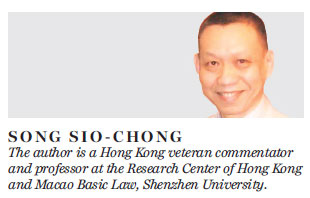Grenville Cross has got it all wrong
Updated: 2016-05-06 06:45
By Song Sio-chong(HK Edition)
|
|||||||||
Song Sio-chong explains why the ex-top prosecutor is quite wrong when he says that advocating independence for Hong Kong cannot be considered a criminal act
There have been acrimonious disputes about whether or not the "Hong Kong National Party (HKNP)", which advocates the "abolition of the Basic Law" and "establishment of the Hong Kong Republic", is criminal. Senior Counsel Grenville Cross, former director of public prosecutions of the Department of Justice, contended in an article published in the South China Morning Post on April 27 that independence advocacy is "not criminal" and "not helpful".
Indeed, the independence advocates are not "helpful", as they are only infuriating Beijing and denying Hong Kong its great future beyond 2047. Nevertheless, I read his arguments on why the "HKNP" is "not criminal" with shock, confusion, sympathy and panic.
I was also shocked when Cross discussed Margaret Thatcher when dismissing the criminal nature of the "HKNP". In the 1980s, Thatcher once considered returning the New Territories to China when the lease expired, and make Hong Kong Island and Kowloon independent. She later abandoned the plan because it was not viable. As a matter of fact, she was not charged with any offense for her advocacy of independence. Isn't it true that merely advocating and lobbying for independence is not criminal?

Well, it depends on the circumstances. Government officials engaging in diplomatic affairs authorized by the sovereign or by law cannot be charged with treason or sedition, unless they do something seriously wrong. When Hong Kong was a British colony, Thatcher was representing the British government in negotiations with China over Hong Kong's future. With British support for her proposed plan, Thatcher was definitely performing her duties and not acting against her country. Another example also illustrates this point well: When France sold Louisiana to the United States in 1803, this went far beyond mere advocacy or lobbying. Would it have made sense if France had prosecuted the French officials in charge of the sale for treason or sedition because they had sold such a valuable piece of land at so low a price to another nation?
Cross' arguments do not really benefit those independence advocates maneuvering behind the "HKNP". Article 1 of the Basic Law solemnly stipulates that Hong Kong is an "inalienable part" of China. Article 12 also states that Hong Kong "shall be a local administrative region" of China. For the prosperity and stability of Hong Kong as well as the nation as a whole, the Central People's Government strongly condemns the advocacy of independence - which is unconstitutional. Therefore, any person who promotes such an idea is acting against the sovereign and is unconstitutional and may be liable for criminal offences under existing Hong Kong laws.
But I was confused when Cross spoke of requirements for using force or violence. It is true that if the national security bill had been passed in 2003, subversion and secession would have been introduced, which would require some elements of force, violence, or serious criminal means to suffice for criminal prosecution.
Luckily or unluckily, the fact is the bill was not passed in 2003 and so the existing crimes in the Crimes Ordinance (Cap 200) like treason, treasonable offences and sedition have not been repealed. It should be noted that treasonable offences (section 3) require "an overt act" or publication, while sedition (section 9) requires items along the lines of exciting disaffection, inciting violence, or counseling disobedience.
I was also actually quite sympathetic when Cross put forward an argument as weak as "freedom of expression". Article 19 of the International Covenant on Civil and Political Rights (ICCPR) provides for the "right to freedom of expression", which are subject to restrictions "provided by law and are necessary for the protection of national security or of public order" No country civilized or uncivilized on Earth would accept "freedom of expression" as an excuse for publishing information threatening national security. Edward Snowden serves as a good example on the non-absolute nature of many civil and personal rights including the right to know or freedom of expression.
Furthermore, the independence advocates have arguably gone outside "freedoms of expression" by setting up a political party by a group of people. They are attempting to register as a company, forming rosters and organizing and attending publicity activities. At their press conference earlier, they have bluntly admitted that they would resort to violence when they consider it necessary. The fact that Hong Kong's ex-top prosecutor is laying grounds for acquittal for these people who endanger the stability and prosperity of the SAR in public is making me panicky.
Cross is no doubt a very influential figure in the criminal law field. His opinions often have considerable value to society at large, especially to other prosecutors in the Department of Justice. A Chinese saying helps to explain this: "The waves behind drive on those before them." I hope incumbent legal experts in the government exercise independent and critical thinking and prosecute criminal offenders wisely with, or without, his advice and analysis.
(HK Edition 05/06/2016 page10)